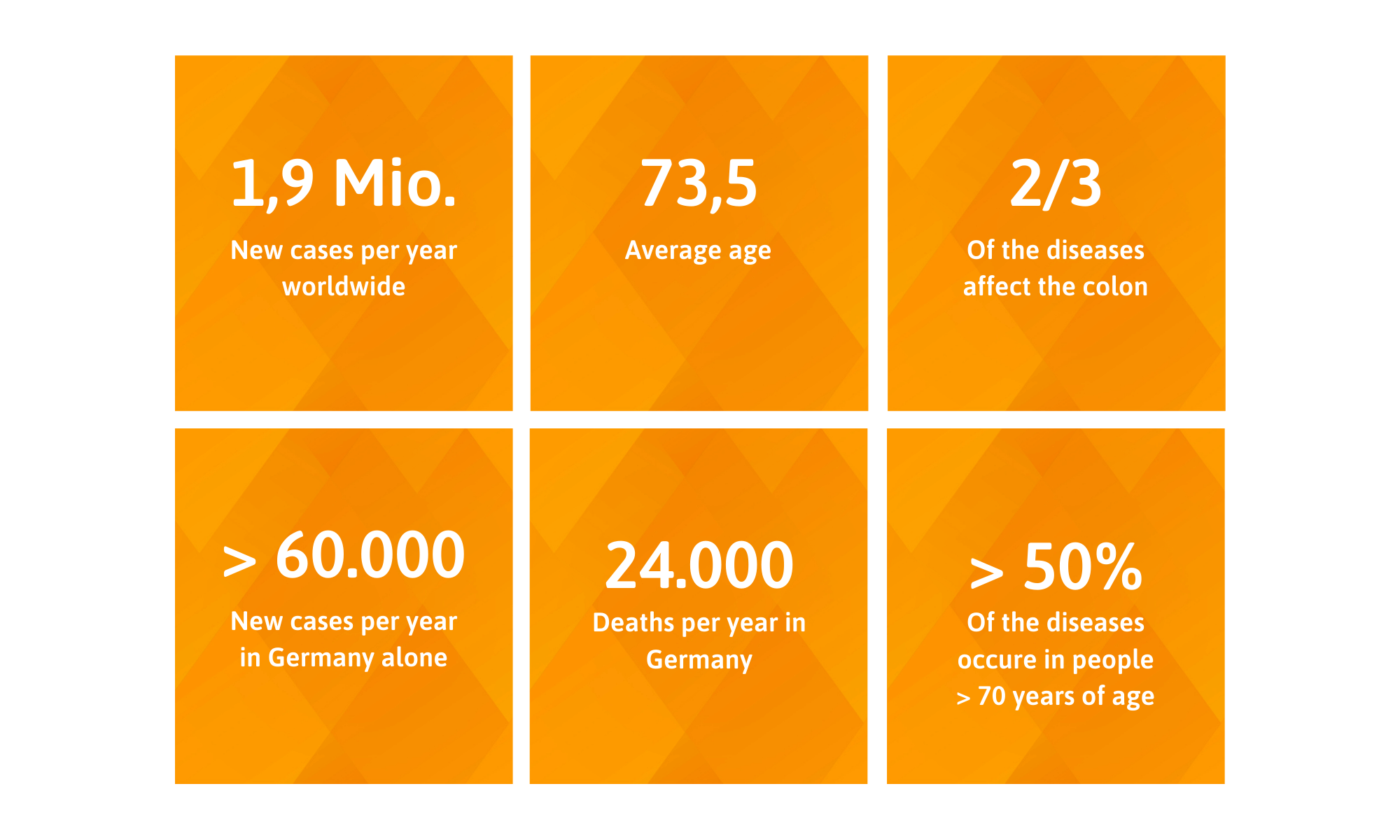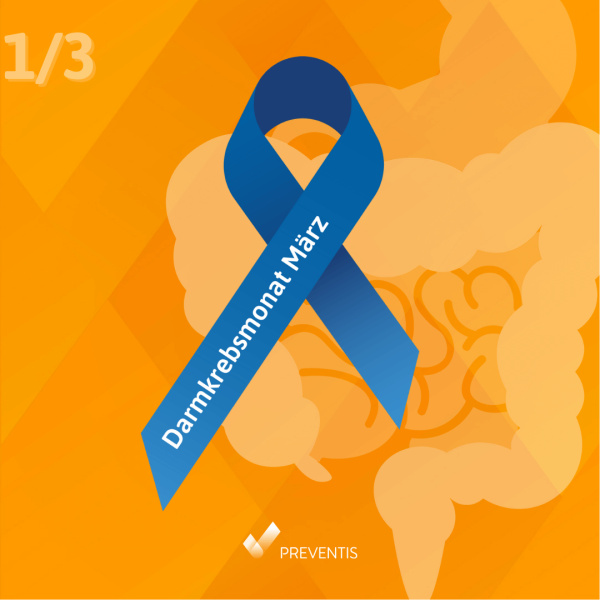Colon Cancer – still a taboo topic:¹ ²
What is bowel cancer and how does the disease develop?² ³ ⁴ ⁵
When we talk about bowel cancer, we usually mean tumours in the large intestine (colon) or in the rectum. Medically, these diseases are referred to as colorectal carcinomas. About one in eight cancers in Germany affect these parts of the intestine. Cancers in the small intestine, which is known to be directly connected to the stomach, are rather rare.
The exact causes for the development of bowel cancer have not yet been clarified in detail. What is known, however, is that a combination of different factors leads to excessive, uncontrolled cell growth in the intestinal mucosa, which in some cases leads to cancer. In most cases, colon cancer develops from growths in the intestinal mucosa, which are called polyps. These initially benign growths often go undetected for years because they rarely cause symptoms. Over time, these very small growths can grow and change or degenerate. However, not all polyps (adenomas) develop into malignant tumours (carcinomas). The severity of the disease is indicated by the Union Internationale Contre le cancer (UICC) by defining different stages of development:
What are the symptoms and signs?⁶
Bowel cancer is often only detected at a very late stage. But what is the reason for this? The main reason is that in the first years of the disease there are often no symptoms at all. The first signs of bowel cancer, if present, are usually rather unspecific and are accompanied by ambiguous symptoms such as fatigue and unexplained weight loss. In the course of the disease, a wide variety of symptoms then appear:
- Altered bowel movements (constipation, diarrhea, pain during bowel movements)
- Frequent urge to have a bowel movement
- Change in the appearance of the stool, reddish or dark discoloration, blood in the stool
- Digestive problems
- Abdominal pain
- Foul-smelling stools
- Feeling that the bowel is not emptying completely
- Flatulence
If the tumor is already more advanced, the symptoms change, and other signs of illness may occur:
- Tiredness, fatigue, reduced physical performance
- Paleness due to anaemia
- Nausea, vomiting
- Mild fever
- Cramps
- Radiating pain in the pelvis or lumbar spine, often perceived as back pain
- Intestinal obstruction

Are there certain risk factors that favor bowel cancer?² ³ ⁷
Anyone can be diagnosed with bowel cancer. Nevertheless, there are certain factors that increase the risk of developing bowel cancer. The main risks are tobacco and alcohol consumption, obesity, lack of exercise, and a poor diet (low fiber, lots of red meat). Family factors also play a role - people with affected family members have a double to triple the risk of also developing the disease. Chronic inflammatory bowel diseases such as Crohn's disease or ulcerative colitis also favor the development of bowel tumors. Last but not least, age and gender also play a major role in the topic of bowel cancer. Men are affected slightly more often than women - the lifetime risk of developing bowel cancer is 5.3 % for women and 6.5 % for men. This means that one in 15 men and one in 19 women will be diagnosed with bowel cancer during their lifetime. The risk of developing the disease continues to rise into old age. More than half of the patients develop the disease after the age of 70, and the average age of onset is 75 (women) or 72 (men). Only one in ten cases occur before the age of 55.
Life expectancy/curability/prevention:¹ ² ⁸
By 2020, it is estimated that almost 1 million people worldwide will have died of colorectal cancer. The relative 5-year survival rate for colorectal cancer patients in Germany is 65% (women) and 63% (men). If the cancer is diagnosed at an early stage, i.e. at best before symptoms appear, the chances of cure and thus life expectancy increase significantly. If the disease is diagnosed at stage I, about 92-95% of those affected survive the first 5 years after diagnosis. Efficient prevention through early detection measures can prevent 40-60% of cancer cases and deaths.
How can I prevent it?⁷
Even if we cannot influence certain factors, such as a genetic predisposition or chronic diseases of the intestinal tract, a healthy lifestyle still contributes significantly to the prevention of bowel cancer. In addition to a healthy diet and plenty of exercises, experts recommend avoiding alcohol and tobacco. Last but not least, prevention through early detection measures such as colonoscopy or tests for occult (hidden) blood in the stool is important for early diagnosis and thus efficient treatment. Regular colorectal cancer screening is also recommended for people under 50 years of age, especially if they have a family history of the disease.

Sources:
¹ Sung H et al. (2021): Global Cancer Statistics 2020: GLOBOCAN Estimates of Incidence and Mortality Worldwide for 36 Cancers in 185 Countries, CA Cancer J Clin. 2021 May;71(3):209-249. doi: 10.3322/caac.21660
The online GLOBOCAN 2020 database is accessible at http://gco.iarc.fr/, as part of IARC’s Global Cancer Observatory.
² Krebs in Deutschland für 2017/2018. 13. Ausgabe. Gesellschaft der epidemiologischen Krebsregister e. V. (GEKID) und Zentrum für Krebsregisterdaten (ZfKD) im Robert-Koch-Institut. Berlin, 2021.
³ https://www.felix-burda-stiftung.de/, aufgerufen am 01.03.2022
⁴ Krebsinformationsdienst (KID) des Deutschen Krebsforschungszentrums (DKFZ): „Dick- und Enddarmkrebs: Anatomie, Entstehung, Häufigkeit“ https://www.krebsinformationsdienst.de/tumorarten/darmkrebs/was-ist-darmkrebs.php (Stand: 06.12.2021)
⁵ Darmkrebs.de: „Krankheitsstadium & Therapie“ https://www.darmkrebs.de/behandlung/krankheitsstadium-therapie (aufgerufen am 02.03.2022)
⁶ Krebsinformationsdienst (KID) des Deutschen Krebsforschungszentrums (DKFZ): „Darmkrebs: Symptome und Warnzeichen“
https://www.krebsinformationsdienst.de/tumorarten/darmkrebs/symptome.php (Stand 20.01.2019)
⁷ Leitlinie „Kolorektales Karzinom“ der Deutschen Gesellschaft für Verdauungs- und Stoffwechselkrankheiten e. V. (DGVS)
⁸ Früherkennungskoloskopie Jahresbericht 2019, Zentralinstitut für die kassenärztliche Versorgung in Deutschland (Hrsg.). Köln, 2021.
